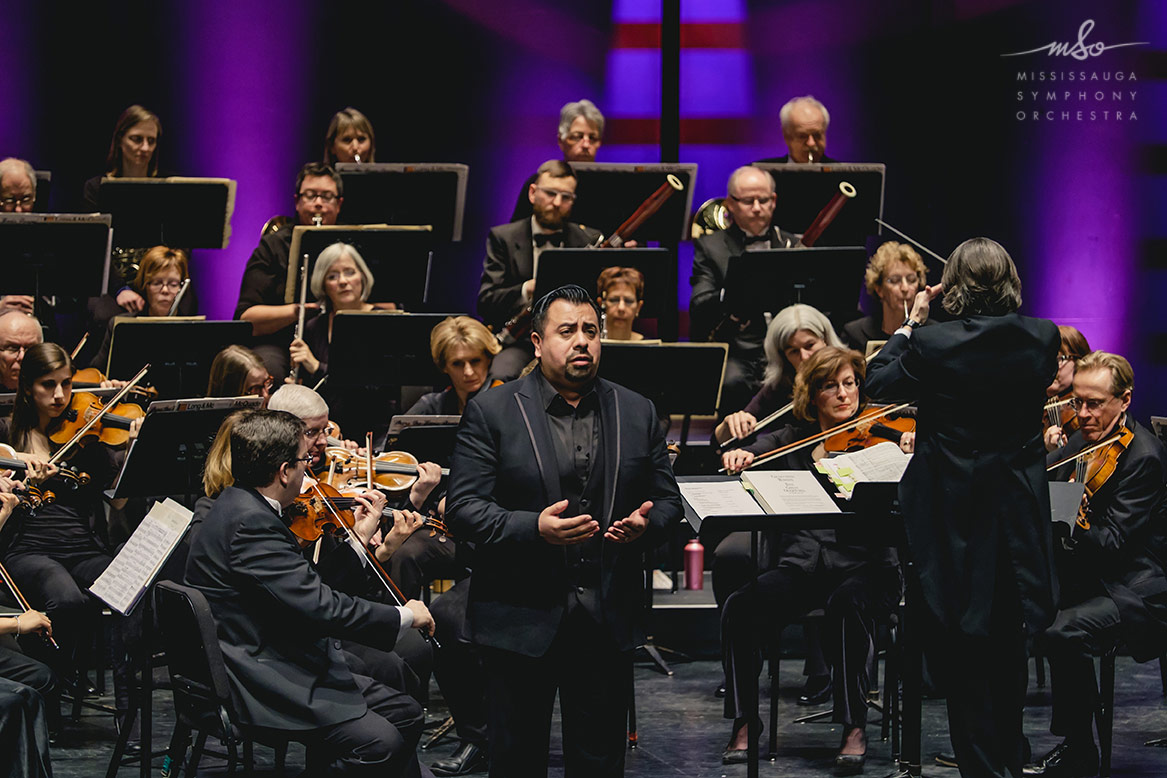
In review: the Mississauga Symphony presents Carmen
ReviewOn Saturday night, I did something new. I went to see an opera in Mississauga.
In an attempt to bring opera back to Toronto’s neighbour to the west, Mississauga Symphony under the baton of maestro Denis Mastromonaco mounted a fully-staged version of Bizet’s perennial favourite, Carmen.
The first thing I have to point out was that the wine was only $6.50 a glass and you could bring it to your seat.
This was a sold out house at the Living Arts Centre in Mississauga, and you could tell by the millings about that most of these people rarely, if ever, go to the opera. To be clear, this is really exciting. It shows the strength of the medium and that it, by no means, is a dying art. The overture started and the audience was still milling about excitedly, chatting and laughing and drinking. It was actually kind of a nice change, even though the Carmen overture is one of my favourite pieces in the canon, it was nice to see the crowd there genuinely having a good time.
The orchestra under Delmonaco played well, although there were balance issues throughout, in particular when the chorus was singing alongside soloists. It felt like the orchestra almost forgot that there were singers involved at times - which is not their fault. They’re a symphony, but it’s up to the conductor to keep the balance true.
Trust me, I know how exciting it can be to sing the Toreador Song with 30 of your closest friends and colleagues - but we still need to hear Escamillo over all that. The Act II finale was loud and exciting, but didn’t seem to have any text. I would have also liked to feel more of a connection between the singers on stage and the conductor at the podium. I found myself uneasy during the quintet, not because it was bad, but because maestro seemed to pay no attention to the singers’ needs to produce such a difficult ensemble (having sung Dancaïro in the past, I can confirm it’s incredibly hard). It seemed like the orchestra started, and the singers just had to keep up; this seemed to be the default setting for this production, which unfortunately robbed it of a lot of the organic feel Carmen normally has when a synergy from stage and pit has been reached.

Playing la Carmencita this time around is rising-star mezzo-soprano Beste Kalender. Beste stepped into the limelight last season when she sang this same role from the pit in a production for Calgary Opera when their lead took ill. She’s been singing it a lot since and you can tell. The voice is a perfect match for the role, creamy and dark with an agility that’s exciting to witness. The “Habanera” was playful and the “Seguidilla” seductive. Sometimes her brilliant, bright smile was out of place with the firecracker of a cigarette girl; I would have loved to feel a bit more edge and bite to Carmen.
As the brigadier Don José, tenor Romulo Delgado was in fine voice. A beautiful instrument with power to spare. Mr. Delgado’s rendition of “La fleur que tu m’avais jetée” was delightfully tender and emotionally laden. While beautifully sung, I found there was a fair bit of stiffness in Delgado’s portrayal that wasn’t part of José’s character. It seemed that there were times on stage when he was uncomfortable doing anything but looking at the maestro in the pit. It robbed his aria of a lot of the poignancy it could have had if he had chosen to deliver it to Carmen and not the orchestra.

Soprano Sara Papini sang the role of Micaëla. A young singer with promise, Ms. Papini sang the unforgiving role of Don José’s childhood friend very well. She sang wonderful high notes, but I would have liked to hear a bit more through-line in her vocal production; it seemed to lean on the “windy” side, and would lose focus during the moving melodic passages. She was tender, clean, bright and delicate. Everything you could want in a Micaëla.
Rounding out the cast of principals was bass-baritone Andrew Tees. A large man with a larger voice he strode around the stage as if he was born there. Singing the superstar Toreador Escamillo was a perfect match for Tees. He strode around the stage, larger than life, ruggedly handsome, and singing with a beautiful rich tone. Tees stole the show for me - as he often does. #Dreamboat
Supporting roles were all sung really well. I was particularly impressed with Adam Harris in the role of Moralès. He had a sweet, melodic tone and I look forward to hearing more from him. As Carmen’s unfortunate suitor Zuniga, Gabriel Sanchez Ortega sang with a surprisingly low and rich voice. As the smugglers Dancaïro and Remendado, Nicholas Borg and Alvaro Robles Vazquez (respectively) were a delight. Physically dynamic and entertaining, the two were the driving force in that devil of a quintet and seemed to be the most comfortable and adept in this performance space. Carmen’s partners-in-crime Frasquita (soprano Sara Schabas) and Mercédès (mezzo-soprano Deanna Pauletto) were beautifully sung and a treat to watch - it really made me wish Bizet had written more music for them.
The stage-direction by David Ambrose, I found, suffered. The theatre was a massive space and the set they were using pressed all the action downstage - which is great considering performer’s innate desire to avoid the lip of a stage - however it led to a lot of delivery “en face” with the cast in large lineups across the stage, making natural reactions and interactions difficult. It’s a long-lost art, the ability to be standing side-by-side with another actor on stage and still have it look like you’re having a face-to-face conversation. It can be done, but it takes practice and an outside eye to guide it along.
All in all, this was a great first shot by MSO to produce an opera. The singing was excellent, the house was packed and appreciative. Issues of production aside, I had fun and I can’t wait to see more productions from MSO in the future.


Comments